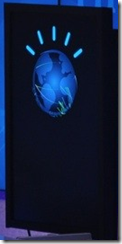All too many time, we are bombarded with what we perceive (or are told) to be the future of computing. Tablet computing, VDI, Cloud, LTE mobile phones, etc… However, that perspective is very short-sighted. That may be the future of computing in the next blink of an eye.
However, recently something shot across my bow that just blew my mind. This is the true future of computing and it is awe inspiring, sexy, and enough to send chills down your spine.
Historically, human vs. computer competitions have been restricted to Chess or Go matches. Limited possibilities for all parties. Decision tree algorithms can be used to narrow down the selection of moves to a win for the computer. Don’t get me wrong, DeepBlue versus Kasparov (http://www.research.ibm.com/deepblue/) was awesome. While I was not glued to the TV for that, the concept is amazing.
This time, IBM has stepped up the game and created their Watson (/DeepQA) supercomputer to compete against the 2 best Jeopardy players, Ken Jennings and Brad Rutter. Seriously, a computer against two amazing knowledge/trivia minds.
Watson embodies the latest in natural language processing and data retrieval technologies. Those crazy IBMers have developed an amazing set of massively complex algorithms that, effectively allow the Watson system to handle the various types of queries that are common from Jeopardy. Watson is able to learn about the reliability of certain algorithms in various scenarios and assign weights that determine which answer it believes is correct. Plus, Watson is in an isolated environment… so, no need to worry about it going all Skynet on us! The implication of the isolated environment is that the content needs to be brought to Watson and it is using a limited subset of what is potentially available on the Internet and other online sources.
One of the key concepts to understand about Jeopardy is that it does not just provide answers. Rather, the answers are stated in multiple fashions. So:
- “William Shakespeare was known to perform his plays here.”
- “What is the Globe Theatre?”
Instead, the question could be asked:
- “Belmont, Pomfret Castle, and The Earle of Glouchester’s castle were all locations found performed in this theatre.”
Or:
- “This theatre was built in 1597-1598 in Bankside in Southwark, London.”
- Plus, the category is commonly used as a clue to the answer: “R- You Serious” may imply that the correct answers begin with the letter “R”.
The coverage from Engadget (http://www.engadget.com/2011/01/13/ibms-watson-supercomputer-destroys-all-humans-in-jeopardy-pract/) is great and contains two amazing videos.
While this exhibition is going to be awesome, this is not just a publicity stunt for IBM. Natural language processing is a highly complex task that researchers are digging into. Think about all of the algorithms that exist to make Watson work. Yet, the Jeopardy contestants can answer questions quicker. As they improve the natural language functions of computing environments, the possibilities open up as to what can be processed, speed, and accuracy. Rather than approach Google with a logical list of search terms, you could ask your question the only way you know how and expect a heavily weighted answer that should be correct. Plus, translation services for international languages could be drastically improved and more accurate. The possibilities are endless. This should be appealing to more than just the computing nerds in the world.
I could get blissfully lost in trying to think about the complexity of such a system. Oh you crazy IBMers!
Check your TV listings for Jeopardy on Feb-14, 2011 and you can see some amazing processing for yourself.
Picture selection from:http://www.blogcdn.com/www.engadget.com/media/2011/01/watson-new-02-gal.jpg
Links:


